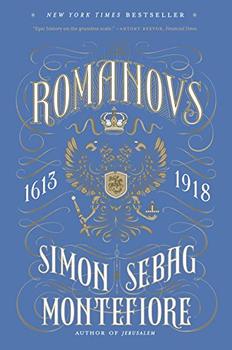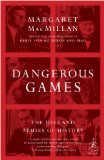Summary | Excerpt | Reviews | Beyond the book | Read-Alikes | Genres & Themes | Author Bio

America's Place in the World from Its Earliest Days to the Dawn of the Twentieth Century
by Robert KaganThis is the first in a two-volume project in
which Kagan lays out his argument that America is not, and never
has been, isolationist. Taking us from the "Pilgrim Fathers" up
to the dawn of the Twentieth Century, Kagan lays out his
position clearly and eloquently. The question is, will his
opinion be a surprise to you? The answer is probably yes if your
knowledge of American history is still grounded in the black and
white history taught in middle-school; but probably no if you're
not American or have read books on similar themes such as Niall
Ferguson's Colossus or Cornel West's Democracy Matters
(both published in 2004).
Kagan breaks down the "pervasive myth" of isolationism starting
with the arrival of the Puritans. He points out that the
Puritans did not plan to cut themselves off permanently from
their roots. On the contrary, in their mind New England and Old
England were part of the same spiritual world - America was
simply a stopping-off point from which to regroup and grow, so
that their descendants would eventually be able to return to the
Old Country. He supports this argument with the observation that
one of the greatest disappointments for the early settlers came
when England's Puritan revolution abandoned rigid Calvinism in
the mid-17th century, leaving the Puritans in North America
theologically isolated.
In short, the Puritan mission, which lies at the heart of many
American's perception of their country, is misunderstood. Added
to that, Puritanism was not as great an influence as many
imagine because it was not long before the sheer wealth of
natural resources available in North America began to undermine
the Calvinist theology, so that within a generation or two "the
guiding principles were not social stability, order and
discipline of the senses but mobility, growth and the enjoyment
of life". Thus colonial America was characterized "not by
isolationism and utopianism .... but by aggressive expansionism,
acquisitive materialism, and an overarching ideology of
civilization that encouraged and justified both."
Just like the Greeks and Romans before them, the colonists did
not consider themselves aggressors, instead they made their way
forward in the conviction that enterprise, trade and the
advancement of civilization were inextricably linked. They
believed that they had a superior faith and culture to spread,
when compared to the beliefs of other groups such as the Native
Americans and French Catholics, and saw themselves spreading
European civilization in the same way that England had spread
civilization to "inferior" races such as the Gaelic Irish and
Highland Scots.
Having set us straight on the early settlers, Kagan moves on to
the War of Independence, and once again destroys much of what we
learned in school. For example, don't we all know that the
colonists' break with Britain was about a desire to be
independent from a country that taxed them unfairly?
According to Kagan, things were a little more complex - the
reality is that Britain had just finished a very costly war (the
"Seven Years' War, 1756-1763), the most tangible outcome of
which was that France's power in the Americas was broken. On the
basis that much of this war had been fought to protect colonial
interests, the British Parliament thought it not unreasonable
that the colonists should pay a portion of the costs, especially
considering that at the time the average man in Britain was
paying 2 to 3 times as much tax as the average colonist.
Exasperating the situation, the colonists did not always respond
in a serious fashion to British efforts to discuss the issues at
hand. One of the more absurd responses proved pivotal in shaping
American's subsequent self-image: Speaking in London in 1766
Benjamin Franklin declared that the colonists had had no
interest in the outcome of the war, saying that it "was really a
British war .. a dispute between the two Crowns" of Britain and
France in which the colonists had no stake and that the
colonists were in "perfect peace with both French and Indians".
This would be all well and good if it wasn't for the fact that
most in the room remembered Franklin's passionate pleas six
years earlier for the conquest and retention of both the Ohio
Valley and Canada! However, it is the latter speech that is
remembered, and which laid another stone in the foundation of
the "American myth of innocence and self-abnegation".
Kagan continues in this vein, describing the Civil War as
America's "first experiment in ideological conquest"; and
follows on with the 19th century expansion, which saw the United
States expand from sea to shining sea, while in the process
kicking out the former controlling countries, namely the
British, Spanish, French, Russians and Mexicans.
One of the most erudite reviews comes from The Washington Post
reviewer, David M Kennedy (winner of the 1999 Pulitzer Prize in
History for Freedom from Fear: The American People in
Depression and War 1929-1945). Kennedy opines that while
Dangerous Nation's prose is sometimes labored, "its
systematic dismantling of accepted dogmas is refreshingly
provocative -- though not all readers will buy its central
thesis that a kind of high-minded pugnacity is encoded in the
national DNA."
![]() This review was originally published in The BookBrowse Review in December 2006, and has been updated for the
November 2007 edition.
Click here to go to this issue.
This review was originally published in The BookBrowse Review in December 2006, and has been updated for the
November 2007 edition.
Click here to go to this issue.

If you liked Dangerous Nation, try these:

by Simon Sebag Montefiore
Published 2017
The Romanovs were the most successful dynasty of modern times, ruling a sixth of the world's surface for three centuries. How did one family turn a war-ruined principality into the world's greatest empire? And how did they lose it all?

by Margaret MacMillan
Published 2010
Margaret MacMillan, an acclaimed historian and “great storyteller” (The New York Review of Books), explores here the many ways in which history – its values and dangers – affects us all, including how it is used and abused.
Your guide toexceptional books
BookBrowse seeks out and recommends the best in contemporary fiction and nonfiction—books that not only engage and entertain but also deepen our understanding of ourselves and the world around us.